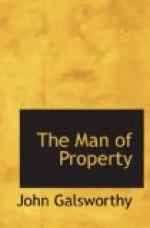The hearse started at a foot’s pace; the carriages moved slowly after. In the first went old Jolyon with Nicholas; in the second, the twins, Swithin and James; in the third, Roger and young Roger; Soames, young Nicholas, George, and Bosinney followed in the fourth. Each of the other carriages, eight in all, held three or four of the family; behind them came the doctor’s brougham; then, at a decent interval, cabs containing family clerks and servants; and at the very end, one containing nobody at all, but bringing the total cortege up to the number of thirteen.
So long as the procession kept to the highway of the Bayswater Road, it retained the foot’s-pace, but, turning into less important thorough-fares, it soon broke into a trot, and so proceeded, with intervals of walking in the more fashionable streets, until it arrived. In the first carriage old Jolyon and Nicholas were talking of their wills. In the second the twins, after a single attempt, had lapsed into complete silence; both were rather deaf, and the exertion of making themselves heard was too great. Only once James broke this silence:
“I shall have to be looking about for some ground somewhere. What arrangements have you made, Swithin?”
And Swithin, fixing him with a dreadful stare, answered:
“Don’t talk to me about such things!”
In the third carriage a disjointed conversation was carried on in the intervals of looking out to see how far they had got, George remarking, “Well, it was really time that the poor old lady went.” He didn’t believe in people living beyond seventy, Young Nicholas replied mildly that the rule didn’t seem to apply to the Forsytes. George said he himself intended to commit suicide at sixty. Young Nicholas, smiling and stroking a long chin, didn’t think his father would like that theory; he had made a lot of money since he was sixty. Well, seventy was the outside limit; it was then time, George said, for them to go and leave their money to their children. Soames, hitherto silent, here joined in; he had not forgotten the remark about the ‘undertaking,’ and, lifting his eyelids almost imperceptibly, said it was all very well for people who never made money to talk. He himself intended to live as long as he could. This was a hit at George, who was notoriously hard up. Bosinney muttered abstractedly “Hear, hear!” and, George yawning, the conversation dropped.
Upon arriving, the coffin was borne into the chapel, and, two by two, the mourners filed in behind it. This guard of men, all attached to the dead by the bond of kinship, was an impressive and singular sight in the great city of London, with its overwhelming diversity of life, its innumerable vocations, pleasures, duties, its terrible hardness, its terrible call to individualism.
The family had gathered to triumph over all this, to give a show of tenacious unity, to illustrate gloriously that law of property underlying the growth of their tree, by which it had thriven and spread, trunk and branches, the sap flowing through all, the full growth reached at the appointed time. The spirit of the old woman lying in her last sleep had called them to this demonstration. It was her final appeal to that unity which had been their strength—it was her final triumph that she had died while the tree was yet whole.




